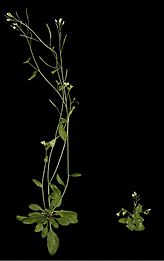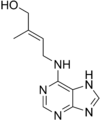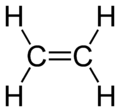Plant hormone facts for kids
Plant hormones (or Phytohormones) are chemicals that regulate plant growth. In the UK they are called 'plant growth substances'. The best known plant hormone is auxin.
Plant hormones are signal molecules produced within the plant. They occur in extremely low concentrations. Hormones regulate cellular processes in targeted cells. Hormones also govern the formation of flowers, stems, leaves, the shedding of leaves, and the development and ripening of fruit.
Plants, unlike animals, lack glands that produce and secrete hormones. Individual cells can produce hormones. They affect which tissues grow upward and which grow downward, leaf formation and stem growth, fruit development and ripening, plant longevity, and even plant death. Hormones are vital to plant growth, and, lacking them, plants would be mostly a mass of undifferentiated cells. So they are also known as growth factors or growth hormones.
Phytohormones are found not only in higher plants, but in algae too, with similar functions. They also occur in fungi and bacteria, where they may be used to induce beneficial reactions in host plants.
Images for kids
-
Phyllody on a purple coneflower (Echinacea purpurea), a plant development abnormality where leaf-like structures replace flower organs. It can be caused by hormonal imbalance, among other reasons.
-
Zeatin, a cytokinin
See also
 In Spanish: Fitohormona para niños
In Spanish: Fitohormona para niños







